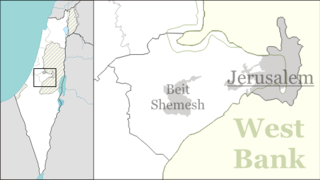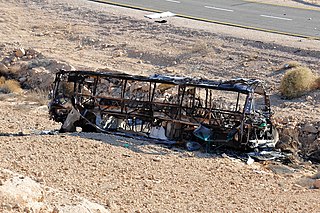Note: This compilation includes only those attacks on Israelis that resulted in casualties and no Palestinian deaths are recorded. Numerous other attacks which failed to kill, maim, or wound are not included.

On 6 March 2008, a lone Palestinian gunman shot multiple students at the Mercaz HaRav yeshiva, a religious school in West Jerusalem. Eight students and the assailant were killed. Eleven more were wounded, five of them placed in serious to critical condition.

Israeli casualties of war, in addition to those of Israel's nine major wars, include 9,745 soldiers and security forces personnel killed in "miscellaneous engagements and terrorist attacks", which includes security forces members killed during military operations, by fighting crime, natural disasters, diseases, traffic or labor accidents and disabled veterans whose disabilities contributed to their deaths. Between 1948 and 1997, 20,093 Israeli soldiers were killed in combat, 75,000 Israelis were wounded, and nearly 100,000 Israelis were considered disabled army veterans. On the other hand, in 2010 Yom Hazikaron, Israel honored the memory of 22,684 Israeli soldiers and pre-Israeli Palestinian Jews killed since 1860 in the line of duty for the independence, preservation and protection of the nation, and 3,971 civilian terror victims. The memorial roll, in addition to IDF members deceased, also include fallen members of the Shin Bet security service, the Mossad intelligence service, the Israel Police, the Border Police, the Israel Prisons Service, other Israeli security forces, the pre-state Jewish underground, and the Jewish Brigade and the Jewish Legion.
On 22 September 2008, a Palestinian drove a BMW saloon car into a group of civilians and off-duty soldiers in a terrorist ramming attack in Jerusalem, injuring 19 people. Stratfor Global Intelligence analysts say this attack represents a new terrorist tactic which is less lethal but could prove more difficult to prevent than suicide bombing.

A bomb attack was carried out in a bus station in downtown Jerusalem, near the Jerusalem International Convention Center compound on 23 March 2011 at 15:00 (GMT+2). The bomb was placed near a bus stop, and detonated when Egged bus No.74 passed the station.

On August 18, 2011, a series of cross-border attacks with parallel attacks and mutual cover was carried out in southern Israel on Highway 12 near the Egyptian border by a squad of presumably twelve militants in four groups. The attacks occurred after Israel's interior security service Shin Bet had warned of an attack by militants in the region and Israeli troops had been stationed in the area. The militants first opened fire at an Egged No. 392 bus as it was traveling on Highway 12 in the Negev near Eilat. Several minutes later, a bomb was detonated next to an Israeli army patrol along Israel's border with Egypt. In a third attack, an anti-tank missile hit a private vehicle, killing four civilians. Eight Israelis – six civilians, one Yamam special unit police sniper and one Golani Brigade soldier—were killed in the multiple-stage attack. The Israel Defense Forces reported eight attackers killed, and Egyptian security forces reported killing another two.
The 2011 Tel Aviv nightclub attack was a combined vehicular assault and stabbing attack carried out at 01:40 (GMT+2) 29 August 2011 in which a Palestinian attacker stole an Israeli taxi cab and rammed it into a police checkpoint guarding the popular nightclub, Haoman 17, in Tel Aviv which was filled with 2,000 Israeli teenagers. After crashing into the checkpoint, the attacker jumped out of the vehicle and began stabbing people. Four civilians, four police officers, and also perpetrator were injured in the attack. The perpetrator was living illegally in Israel at the time of the attack.

The 2012 Tel Aviv bus bombing was a mass-injury terror attack carried out on November 21, 2012, on a crowded passenger bus driving in the center of Tel Aviv's business district. The attack was carried out by an Israeli citizen of Arab descent, who remotely detonated an explosive device, which he had hid on the bus in advance. Twenty-eight civilians were injured in the attack, among them three who were injured seriously. The attack was carried out on the 8th and last day of Operation Pillar of Defense, only a few hours before the ceasefire was reached.
On 5 November 2014, in a terrorist ramming attack, a Hamas operative deliberately drove a van at high speed into a crowd of people waiting at the Shimon HaTzadik light rail station in the Arzei HaBira neighborhood of Jerusalem.
The 2014 Alon Shvut stabbing attack occurred on 10 November 2014, when Palestinian Maher al-Hashlamun first attempted to run his vehicle into a crowd waiting at the bus/hitch-hiking station at the entrance to the Israeli settlement of Alon Shvut, in the Gush Etzion section of the occupied West Bank, then, when the car was stopped by a bollard, got out and attacked with a knife, killing a young woman and wounding two others. The attack occurred four hours after the killing of Sergeant Almog Shiloni in Tel Aviv and took place at the same bus/hitch-hiking stop where three Israeli teenagers were kidnapped and murdered in June 2014.

On the morning of 18 November 2014, two Palestinian men from Jerusalem entered Kehilat Bnei Torah synagogue, in the Har Nof neighborhood of Jerusalem, and attacked the praying congregants with axes, knives, and a gun. They killed four dual-nationality worshippers, and critically wounded a responding Druze Israeli police officer, who later died of his wounds. They also injured seven male worshippers, one of whom never woke up from a coma and died 11 months later. The two attackers were then shot dead by the police.
On 29 June 2015, Hamas gunmen opened fire on a civilian vehicle moving along Israeli Route 60 near Shvut Rachel in the West Bank. Four Israelis in the car were wounded and rushed to hospital, where one died. The suspects were later arrested.
On 19 November 2015, a Palestinian gunman opened fire on a line of traffic near Alon Shvut in the West Bank and continued to fire as he drove the car towards Gush Etzion Junction where he lost control of the vehicle, which then crashed into another vehicle. As a result, 3 civilians were killed and 5 were wounded.

A bomb attack was carried out on a bus in the Talpiot neighborhood in Jerusalem on 18 April 2016 at around 18:00. The bomber was a member of Hamas, which however did not claim responsibility. At least 21 people were injured, two critically.
Husam Badran is the former leader of Hamas’s military wing in the northern West Bank. He was the orchestrator of several suicide bombings during the Second Intifada with the highest number of fatalities including the 2001 bombing which resulted in the Dolphinarium discotheque massacre in Tel Aviv which killed 21 people. Currently Badran serves as the international spokesperson for Hamas using Twitter, Facebook, and news media to encourage Hamas militants to commit acts of political violence against Israelis and the Israeli government. He lives in Doha, Qatar.
On 9 October 2016 in Jerusalem, Musbah Abu Sbaih, a Hamas militant shot 8 people from a car near the Ammunition Hill light rail stop, killing two and wounding six. The police gave chase, Shaih was shot and killed while shooting at pursuing police.

Micah Lakin Avni is an Israeli businessman, attorney and a human rights and anti-terrorism activist.
Alexander Levlovich was an Israeli who was killed in East Jerusalem on 13 September 2015, by Palestinians who hurled rocks at the car he was driving. He died in hospital the following day. Levlovich was the first casualty in the 2015-2016 wave of violence in Israeli-Palestinian conflict. The wave of violence began when Muslim youths gathered at the al-Aqsa Mosque, with the intention of blocking visits by Jews to the Temple Mount on the eve of the Rosh Hashanah holiday. The youths barricaded themselves inside the Mosque, hurling rocks and flares at police as the police used tear gas and threw stun grenades in an attempt to quell the violence. Social media campaigns rapidly spread news of the rioting, which quickly sparked rock-throwing and stabbing attacks in nearby neighborhoods.

On 23 November 2022, two bomb attacks were carried out at bus stops on the outskirts of Jerusalem. Two civilians were killed and 46 were injured. They were the first bombings carried out on Israeli civilians since the 2016 Jerusalem bus bombing, in which a suicide bomber injured at least 22 people.








